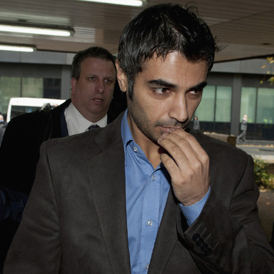Pakistan captain Butt gets 30 months for spot-fixing
Former Pakistan test cricket captain Salman Butt is jailed for two years and six months for his part in a conspiracy to bowl deliberate no-balls in a Lord’s test match against England.

Pakistan’s former world number two test bowler Mohammad Asif was also jailed, for one year, for his involvement in the plot by intentionally bowling a no-ball during the Lord’s test.
Teenage fast bowler Mohammad Amir was jailed for six months after admitting bowling two deliberate no-balls in the same match.
Cricket agent Mazhar Majeed was sent down for two years and eight months for plotting to fix parts of Pakistan’s Lord’s and Oval test matches against England last summer.
During the trial, the court heard that an undercover News of the world reporter investigating cricket match-fixing paid Majeed £150,000 to rig games.
A statement by the Pakistan Cricket Board called today “a sad day for Pakistan cricket. It continued: “Instead of having pride in playing for their country, these players chose to disappoint their supporters, damage the image of their country and bring the noble game of cricket into disrepute.
“There is little sympathy in Pakistan for the sorry pass they have come to.”
‘Wonderfully ethical people’
The head of the International Cricket Council (ICC) anti-corruption unit, former top UK policeman Sir Ronnie Flanagan, has insisted there is only “a tiny number” of cricketers involved in match-fixing.
Discussing corruption in the world of cricket, he said: “I think it is engaged in by a tiny number of people.”
But he admitted the scandal which saw three Pakistan players jailed today is not an solitary case. “Sadly, I wouldn’t say the instances we have seen brought to justice are totally isolated either,” Sir Ronnie said.
“They indicate we must be ever vigilant. They indicate that the hard work and the wonderful platform established by Lord Condon, which we have been able to build upon, is such we must never be complacent.”
Sir Ronnie went on to describe “the vast, vast majority of cricketers” as “wonderfully ethical people”.
Toothless procedures?
In the wake of the News of the World sting, the ICC’s anti-corruption procedures have been criticised as toothless in some quarters.
Butt, Asif and Amir were found guilty of spot-fixing by the ICC’s own investigation earlier in 2011. In February the ICC banned them from international and domestic cricket for five years.
It was thought that, given the cricketers’ ages at the time – respectively 26, 28 and 19 – they would all be in a position to resume professional cricket after the bans had expired.
No longer a genuine contest
"Now whenever people look back on a surprising event in a game or a surprising result, or whenever in the future there are surprising events or results, followers of the game who have paid good money to watch it live or watch it on television will be left to wonder whether there has been fixing and whether what they have been watching is a genuine contest between bat and ball.
"What ought to be honest sporting competition may not be such at all."
Mr Justice Cooke, judge in the spot-fixing trial